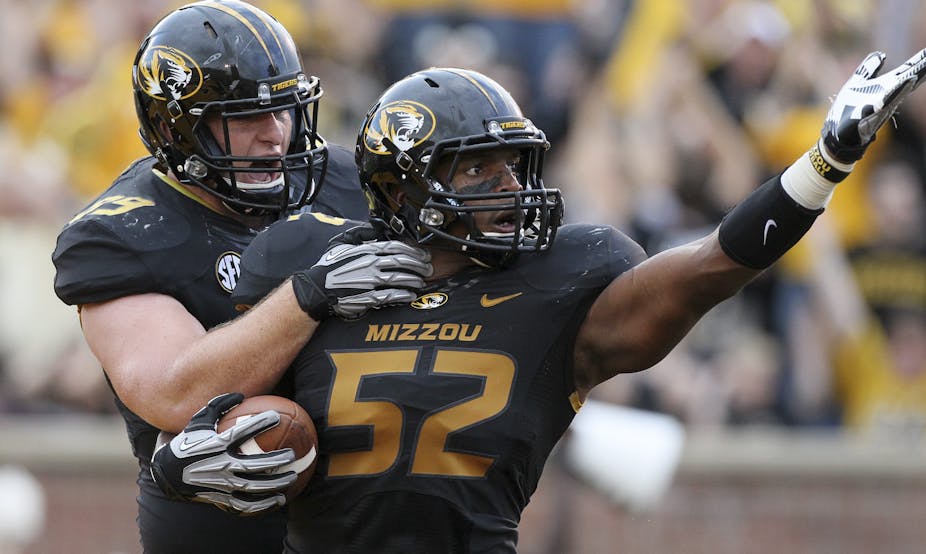Any lingering doubts about the political power of popular culture have surely been dispelled in the last couple of weeks. When actor Ellen Page courageously fought tears to come out before a global audience, she became the latest in a string of young celebrities who have chosen to embody the struggle for LGBT rights.
Australian snowboarder Belle Brockhoff arrived at the Winter Olympics in Sochi determined to take a stand against state-sanctioned homophobia. Brockhoff, who is gay, has been subjected to social media abuse because of this.
American NFL prospect Michael Sam announced recently that he, too, is gay. With the NFL draft fast approaching, Sam has knowingly jeopardised his professional future. The draft – a highly anticipated and cherished media event in its own right – transforms college athletes into multi-millionaire superstars overnight.
Sports Illustrated reported that Sam’s disclosure reduces the chances of this happening to him. This prompted an apoplectic commentary piece from US sports presenter Dale Hansen, comparing Sam to baseball and civil rights hero Jackie Robinson.
Each young star has found their simple ambition – to shred, play ball and act – caught in a gossamer, created by global media’s voracious appetite for dramatised politics. They’ve also taught the world why we should all care about LGBT rights.
While you’ve heard of Brockhoff, Sam and Page, you probably haven’t heard of sociologist Stuart Hall. Brockhoff, Sam and Page have used their celebrity status to make the world a better place. But it’s Hall, who died last week, who clarifies why their actions matter. As young celebrities adeptly exploit the political potential of global media, their actions underline the significance of Hall’s insights.
Hall was one smart cookie. Obituaries hailed him as “the godfather of multiculturalism” and the creator of the term “Thatcherism”. Arriving at Oxford from Jamaica in the 1950s, Hall lived on the frontline of changing post-war British cultural politics, and then told everyone what these changes meant.
Among his many intellectual achievements, Hall translated the complex theoretical work of Italian marxist Antonio Gramsci into a sophisticated tool for explaining the connections between entertainment, popular common sense and political leadership. This feat continues to inform public political thought.
Yet Hall’s fearsome intellectual skill came wrapped in a polite disdain for academia. He didn’t see much point in scholarship that didn’t speak to a non-academic audience.
Hall’s reasons were deeply personal. As a young man, he had witnessed his sister’s decline into devastating mental illness, brought on by a failed love affair. A simple relationship with a young doctor was torn apart because it crossed barriers of race and class in colonial Jamaica.
For Hall, his sister’s fate tragically embodied a savage truth: that there is no personal life, and we are all children of political histories that can ruin us. But, crucially, knowing this is first step to salvation.

Hall thought that the road to happiness, for ordinary people, lies in being able to decipher how personal experience reflects broader political realities. As his work progressed, so it centred more and more on popular culture and political consciousness.
In the 1980s, the man who had made his name making sense of impenetrable Marxist theory lauded Live Aid, Bob Geldof and Bruce Springsteen for breathing life into apparently moribund ideas.
British Labour struggled to convince voters that class still mattered and unfettered free markets were socially corrosive. “The Boss” and Geldof used entertainment to get audiences singing along to the same ideas. This dramatised key themes in Hall’s work: that global entertainment shows us where we are in the world, how we got here, and can create compelling images of where we should go.
Despite its sophistication and fascinating history, there’s a distinct Australian simplicity to Hall’s main conviction. It’s just about giving people a fair go.
A touching, funny story emerged about Hall last week. At a dinner in the later years of his life, so the story goes, Hall was asked what he wanted. The question was about his political aspirations. So was his answer: “a power shower”.
The answer was a characteristically polite and humorous rebuke. Effective politics starts with the ordinary hopes of ordinary people.
And that’s where the scholar meets the stars. Brockhoff just wants to shred, Page just wants to act, Sam just wants to play ball. But they all know that their simple ambitions are affected by how the global sport/entertainment/media complex processes their sexuality.
And right now, things don’t look too good for Sam, while Brockhoff has been subjected to vile abuse. Hall would have said that we need to listen to these young people very carefully. We should hear that.

